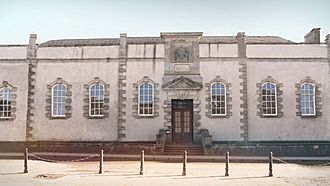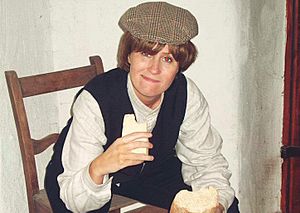Lifford Courthouse facts for kids
Quick facts for kids Lifford Courthouse |
|
|---|---|

Lifford Courthouse
|
|
| General information | |
| Architectural style | Neoclassical style |
| Address | Lifford, County Donegal |
| Country | Ireland |
| Coordinates | 54°49′59″N 7°28′43″W / 54.8331°N 7.4787°W |
| Completed | 1746 |
| Design and construction | |
| Architect | Michael Priestley |
Lifford Courthouse is a judicial building situated in the centre of Lifford, County Donegal, in Ulster, Ireland.
History
The courthouse, which was designed by Michael Priestley in the neoclassical style and built in ashlar stone, was completed in 1746. Previously courts had been held in any suitable building and in one case, when the court met in a public house, the fines collected over the course of a day was used to buy drinks for the jury. The building also incorporated a prison in the basement until a purpose-built facility was opened next to the courthouse in 1793. The design involved an asymmetrical main frontage with eight bays facing The Diamond; the central bay featured a doorway with a banded stone surround and a pediment; there was a stone panel containing the coat of arms of George II above the doorway.
The building was originally used as a facility for dispensing justice but, following the implementation of the Local Government (Ireland) Act 1898, which established county councils in every county, the Grand Jury Room also became the meeting place for Donegal County Council. The purpose-built prison next to the courthouse was demolished in 1907 and the county council moved to County House on the opposite side of the Diamond in 1930.
The building continued to be used as a courthouse until 1938 and then fell into disrepair before being renovated in the late 1980s and then being fully renovated in the early 1990s and being reopened as a Heritage Centre in 1994.
Notable prisoners
Notable prisoners included:
- John MacNaghten, convicted murderer.
- James Napper Tandy, founding member of the Society of United Irishmen.
- The crew of "La Hoche". the French frigate on which Wolfe Tone was captured.
Visitor centre
Today, the old courthouse operates as a museum, where the public can walk through the cells and experience life as a prisoner. Visitors to the prison are 'arrested' and taken down into the dungeons on the guided tour. This takes the form of a one-man show in which an actor portrays some of the jail's infamous residents. The building also now houses a bistro, a local library, conference rooms and often hosts special events.



